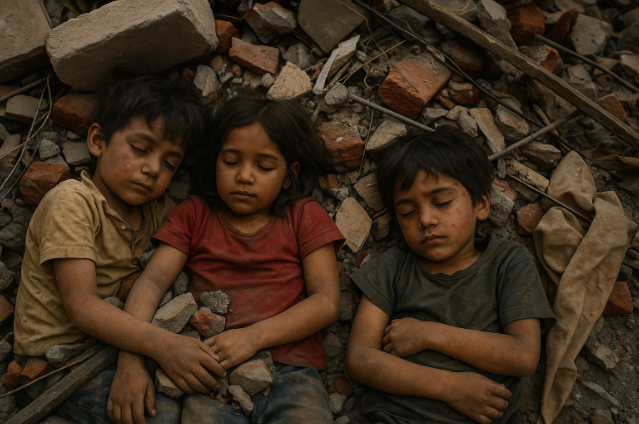
On the fateful morning of Friday, July 25, 2025, the tranquil routine of a government school in Piplodi village, nestled in the Jhalawar district of Rajasthan, was shattered. The ceiling of a classroom at Piplodi Government Upper Primary School came crashing down, killing seven children on the spot and injuring twenty-one more.
The devastation was not caused by nature or fate, but by the rot that runs deep in our nation's governance. Eyewitnesses report that moments before the collapse, a teacher was alerted to falling pieces of plaster and told the students to "sit quietly" while she left the classroom, possibly to seek help. Tragically, the students obeyed.
The Rot in the Foundation: Infrastructure Decay in Government Schools
While India speaks of becoming a digital superpower and exploring the moon and Mars, millions of children continue to study under unsafe, crumbling roofs. According to the Unified District Information System for Education (UDISE+) 2022–23, nearly 22% of government schools across India lack proper building maintenance.
In Rajasthan alone, over 14,000 government schools have flagged issues with their physical infrastructure. The tragedy in Piplodi is a grim reminder of the consequences of neglecting school infrastructure.
A Crisis Beyond Piplodi: A Pattern of Neglect
The tragedy in Piplodi is not an isolated incident. In fact, it fits a grim pattern. Similar incidents have been reported in other parts of the country, highlighting the need for systemic reforms.
Accountability or Cosmetic Measures?
Following the Piplodi disaster, the Rajasthan Education Minister announced ₹10 lakh ex gratia compensation for the families of the deceased and a contractual government job for one member of each affected family. While these gestures might be politically prudent, they fail to address the structural problem.
Real accountability would mean:
- An independent probe into the collapse
- An audit of all recent infrastructure projects in the region
- Criminal proceedings against contractors and government officials found guilty of negligence or fraud
The Political Theatre: Blame Games and Hollow Promises
Within hours of the tragedy, political parties began exchanging accusations. The ruling party blamed the previous government for weak infrastructure spending, while the opposition pointed fingers at the current misgovernance and rampant corruption.
Structural Rot and Siphoning: Where Does the Money Go?
Investigations into many government construction projects have unearthed how funds are routinely diverted. Common techniques include over-invoicing, inflated bills, and use of substandard materials.
An Ethical Collapse: How Did We Get Here?
Beyond the figures and broken bricks lies a deeper malaise: a collapse of societal ethics. We have grown numb to daily injustices, especially when the victims are poor, rural, or marginalized.
What Needs to Be Done: Pathways to Better Governance
The tragedy must become a turning point, not just another footnote. Here's what a serious response would entail:
- Mandatory safety audits for all government school buildings
- Public infrastructure transparency portals
- Empowered parent-teacher committees
- Whistleblower protections
- Real penalties for negligence
- Stronger local journalism
- Shift in national priorities
Voices from the Ground: Grief That Lingers
One of the mothers whose son died in the Piplodi collapse said, "Woh bahut padhne mein tez tha… doctor banna chahta tha…" (He was very good in studies. He wanted to become a doctor.) What future was snatched away in that instant?
Mourning Must Lead to Movement
The fallen ceiling at Piplodi was not an accident. It was the natural outcome of unnatural neglect; a result of years of indifference, inefficiency, and unchecked corruption. Unless we confront this truth, unless we act decisively, this will happen again.
